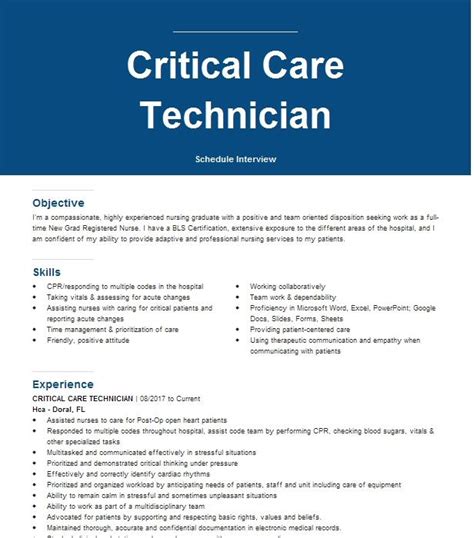Critical care technicians, also known as cardiovascular technologists or cath lab technicians, play a crucial role in the medical field. They are responsible for assisting physicians and other medical professionals in diagnosing and treating patients with cardiovascular and other critical conditions. Here are five key responsibilities of a critical care tech:
1. Preparing Patients for Procedures
Critical care technicians are responsible for preparing patients for various medical procedures, such as cardiac catheterizations, angiograms, and other diagnostic tests. This involves explaining the procedure to the patient, answering any questions they may have, and ensuring that they are properly positioned and comfortable on the examination table. Critical care techs also ensure that all necessary equipment is available and functioning properly before the procedure begins.

2. Assisting Physicians During Procedures
During medical procedures, critical care technicians assist physicians by operating equipment, monitoring patient vital signs, and maintaining a safe and sterile environment. They may also be responsible for administering medications, injecting contrast agents, and performing other tasks as directed by the physician. Critical care techs must be able to think critically and respond quickly in emergency situations.
**Key Skills for Critical Care Technicians**
To be successful in this role, critical care technicians must possess certain key skills, including:
- Strong communication and interpersonal skills
- Ability to work well under pressure and think critically
- Knowledge of cardiovascular anatomy and physiology
- Proficiency in operating medical equipment and software
- Ability to maintain a safe and sterile environment
3. Monitoring Patient Vital Signs
Critical care technicians are responsible for monitoring patient vital signs during medical procedures, including heart rate, blood pressure, oxygen saturation, and other parameters. They must be able to quickly identify any changes or abnormalities in these vital signs and notify the physician immediately. Critical care techs may also be responsible for performing electrocardiograms (ECGs) and other diagnostic tests.
**Patient Monitoring Equipment**
Critical care technicians use a variety of equipment to monitor patient vital signs, including:
- Electrocardiogram (ECG) machines
- Blood pressure monitors
- Pulse oximeters
- Cardiac monitors
- Defibrillators

4. Maintaining a Safe and Sterile Environment
Critical care technicians are responsible for maintaining a safe and sterile environment during medical procedures. This involves ensuring that all equipment is properly sterilized and that the patient is properly positioned and prepared for the procedure. Critical care techs must also be aware of any potential hazards, such as radiation exposure or electrical shock, and take steps to minimize these risks.
**Infection Control Measures**
Critical care technicians use a variety of infection control measures to maintain a safe and sterile environment, including:
- Proper hand hygiene
- Use of personal protective equipment (PPE)
- Sterilization of equipment
- Proper disposal of biohazardous waste
5. Providing Patient Education and Support
Critical care technicians play an important role in educating patients and their families about their condition and treatment options. They may also provide emotional support and reassurance to patients who are anxious or frightened. Critical care techs must be able to communicate complex medical information in a clear and concise manner, taking into account the patient's level of understanding and cultural background.
**Patient Education Topics**
Critical care technicians may provide patient education on a variety of topics, including:
- Medication management
- Lifestyle modifications
- Follow-up care and appointments
- Warning signs and symptoms of complications

In conclusion, critical care technicians play a vital role in the medical field, assisting physicians and other medical professionals in diagnosing and treating patients with cardiovascular and other critical conditions. By understanding the key responsibilities of a critical care tech, we can appreciate the important work that these professionals do every day.
Gallery of Critical Care Tech Roles





FAQ Section
What is the role of a critical care technician?
+A critical care technician is a medical professional who assists physicians and other medical professionals in diagnosing and treating patients with cardiovascular and other critical conditions.
What are the key responsibilities of a critical care tech?
+The key responsibilities of a critical care tech include preparing patients for procedures, assisting physicians during procedures, monitoring patient vital signs, maintaining a safe and sterile environment, and providing patient education and support.
What education and training are required to become a critical care tech?
+To become a critical care tech, one typically needs to complete a post-secondary training program in cardiovascular technology or a related field, and obtain certification through a professional organization such as the Cardiovascular Credentialing International (CCI) or the American Registry of Diagnostic Medical Sonography (ARDMS).
